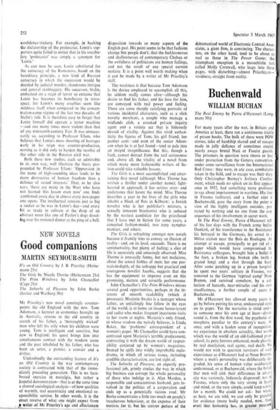NEW NOVELS
Good companions
MARTIN SEYMOUR-SMITH
It's an Old Country by J. B. Priestley (Heine- mann 25s) The Girls by Nicola Thorne (Heinemann 21s) The Prim Windows by John Chancellor (Cape 21s) The Suburbs of Pleasure by John Burke (Seeker and Warburg 30s)
Mr Priestley's new novel cunningly counter- points the old England with the new. Tom Adamson, a lecturer in economics brought up in Australia, returns to the old country in search of his father, a 'thoroughly wicked' man who left his wife when his children were young. Tom is intelligent and sensitive, but new to England; his quest brings him into simultaneous contact with the modern scene and the past inhabited by his father, who has been an actor, a painter, a convict and a drifter.
Undoubtedly the outstanding feature of It's an Old Country is the way contemporary society is contrasted with that of the imme- diately preceding generation. This is no lucu- brated exercise in nostalgia, but rather a hopeful demonstration—that is at the same time a shrewd sociological analysis—of how qualities of warmth, real eccentricity and emotional re- sponsibility survive. In other words, it is the exact reverse of what one might expect from kwriter of Mr Priestley's age and affectionate
disposition towards so many aspects of the English past. His point seems to be that fashions change but people don't; that the fecklessnesses and shallownesses of contemporary Chelsea or the awfulness of politicians are human failings, and not the result of any special current malaise. It is a point well worth making when it can be made by a writer of Mr Priestley's skill.
The weakness is that because Tom Adamson is the device employed to accomplish all this, he seldom really comes alive—although his desire to find his father, and his love for him, are conveyed with real power and feeling. There are some sharply satisfying portraits of various incidental characters, such as a slick novelty merchant, a couple who manage a midlands club, a crooked private inquiry agent and a variety act that is hideously devoid of vitality. Against this vivid authen- ticity the figures of Tom, his girl friend, her painter aunt—and even of the senior Adam- son when he is at last found—tend to pale into an insipid insignificance. But this, though a fault, cannot detract from the real seriousness and, above all, the vitality of a novel from which many more fashionable writers of fic- tion could take valuable lessons.
The Girls is a most accomplished and enter- taining first novel (although Miss Thorne has written a thriller under another name); light- hearted in approach, it has serious over- and undertones that haunt the mind. Miss Thorne describes a year in the lives of the girls who inhabit a block of flats in Kilburn: a Jewish novelist who is her publisher's mistress, a sexually innocent biochemist who is seduced by the nastiest candidate for the priesthood that I have met in fiction for some years, a conceited fashion-model, two zany nympho- maniacs, and others.
The Girls is refreshing amongst new novels because it frankly tries to convey an illusion of reality—and, on its level, succeeds. There is no sentimentality, but plenty of feeling; a slice of life is accurately and amusingly observed. Miss Thorne is unusually funny, but not malicious, about the sexual foibles of men; her one por- trait-in-depth, of the unhappy but practical and courageous novelist Jacoba, suggests that she has the equipment to improve even on this promising, mature and versatile performance.
John Chancellor's The Prim Windows misses several good opportunities, perhaps in the in- terests of smooth readability (which it possesses). Marjorie Swales is a teenager whose father, an unfailingly fine fellow in the eyes of the world, is at home an insane house-tyrant and sadist who makes frequent incestuous visits to her room at nights. Marjorie's only friend, in whose wisdom she naïvely believes, is Linda, Baker, the 'problems' correspondent of a • women's paper. Mr Chancellor could have con- centrated upon Marjorie's terrible predicament, contrasting it with the dream world of respect- ability conjured up by women's magazines. Instead he spills into wildly improbable melo- drama, in which all serious issues, including credible characterisation, are lost sight of.
The Suburbs of Pleasure, an expertly pro- fessional job, grimly studies the way in which big business can corrupt the whole personality of those who indulge in it. Alan Marden, a responsible and conscientious husband, gets in- volved in the politics of a corporation and ends up as a potentially vicious roué. Mr Burke concentrates a little too much on people's treacherous behaviour, at the expense of their motives for it; but his sinister picture of the dehumanised world of Electronic Control Asso- ciates, a giant firm, is convincing. The charac- ters, on the other hand, tend to be about as real as those in The Power Game; the triumphant exception is a masochistic tart called Molly Cornwall, who leaps into these pages, with disturbing—almost Priestleyan- vividness, straight from reality.


































 Previous page
Previous page